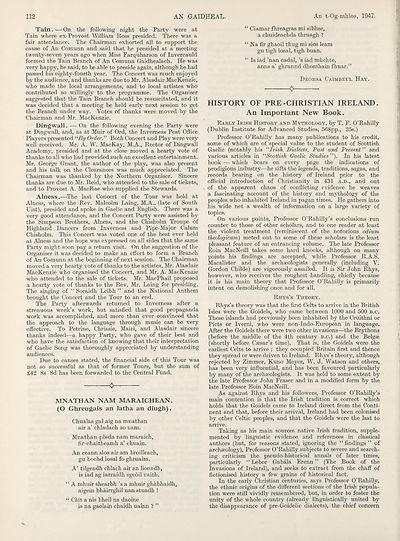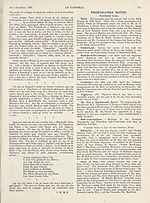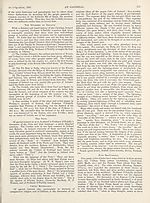An Comunn Gàidhealach Publications > Gaidheal > Volume 42, October 1946--September 1947
(120) Page 112
Download files
Complete book:
Individual page:
Thumbnail gallery: Grid view | List view

112
AN GAIDHEAL.
An t-Og-mhios, 1947.
Tain. — On the following night the Party were at
Tain where ex-Provost William Ross presided. There was a
fair attendance. The Chairman exhorted all to support the
cause of An Comunn and said that he presided at a meeting
twenty-seven years ago when Miss Farquharson of Invercauld
formed the Tain Branch of An Comunn Gaidhealach. He was
very happy, he said, to be able to preside again, although he had
passed his eighty-fourth year. The Concert was much enjoyed
by the audience, and thanks are due to Mr. Alasdair MacKenzie,
who made the local arrangements, and to local artistes who
contributed so willingly to the programme. The Organiser
suggested that the Tain Branch should be resuscitated, and it
was decided that a meeting be held early next session to get
the Branch under way. Votes of thanks were moved by the
Chairman and Mr. MacKenzie.
Dingwall. — On the following evening the Party were
at Dingwall, and, as at Muir of Ord, the Inverness Post Office
Players presented “By Order." Both Concert and Play were very
well received. Mr. A. W. MacKay, M.A., Rector of Dingwall
Academy, presided and at the close moved a hearty vote of
thanks to all who had provided such an excellent entertainment.
Mr. George Grant, the author of the play, was also present
and his talk on the Clearances was much appreciated. The
Chairman was thanked by the Northern Organiser. Sincere
thanks are due to Mr. Reid, who attended to the sale of tickets,
and to Provost A. MacRae who supplied the Stewards.
Alness.—-The last Concert of the Tour was held at
Alness, where the Rev. Malcolm Laing, M.A., (late of South
Uist), presided and spoke in Gaelic and English. There was a
very good attendance, and the Concert Party were assisted by
the Simpson Brothers, Alness, and the Chisholm Troupe of
Highland Dancers from Inverness and Pipe-Major Calum
Chisholm. This Concert was voted one of the best ever held
at Alness and the hope was expressed on all sides that the same
Party might soon pay a return visit. On the suggestion of the
Organiser it was decided to make an effort to form a Branch
of An Comunn at the beginning of next session. The Chairman
moved a very hearty vote of thanks to the artistes, Mr. Alasdair
MacKenzie who organised the Concert, and Mr. A. MacKenzie
who attended to the sale of tickets. Mr. MacPhail proposed
a hearty vote of thanks to the Rev. Mr. Laing for presiding.
The singing of “ Soraidh Leibh ” and the National Anthem
brought the Concert and the Tour to an end.
The Party afterwards returned to Inverness after a
strenuous week’s work, but satisfied that good propaganda
work was accomplished, and more than ever convinced that
the approach to the language through music can be very
effective. To Petrine, Chrissie, Mairi, and Alasdair sincere
thanks indeed—a happy Party, who gave of their best and
who have the satisfaction of knowing that their interpretation
of Gaelic Song was thoroughly appreciated by understanding
audiences.
Due to causes stated, the financial side of this Tour was
not so successful as that of former Tours, but the sum of
£42 8s 8d has been forwarded to the Central Fund.
$
MNATHAN NAM MARAICHEAN.
(O Ghreugais an latha an diugh).
Chualas gal aig na mnathan
air a’ chladach so uam.
. Mnathan-p6sda nam maraich,
fir-chaitheamh a’ chuain.
An ceann sios air am broilleach,
gu bochd iosal fo ghruaim.
A’ tilgeadh chlach air an lionadb,
is iad ag iarraidh sgeoil uaith.
“ A mhuir shearbh’s a mhuir ghabhaidh,
aigein bhairrghil nan stuadh !
“ Chit a nis bheil na daoine
is na gaolain chaidh uainn ? ”
“ Ciamar fhreagras mi sibhse,
a chuideachda thruagh ?
“ Na fir ghaoil thug mi sios learn
gu tigh iosal, tigh buan.
“ Is iad ’nan cadal, ’s iad mfichte,
anns a’ ghrunnd dhomhain fhuar.”
Deoksa Caimbeul Hay.
c>
HISTORY OF PRE-CHRISTIAN IRELAND.
An Important New Book.
Early Irish History and Mythology, by T. F. O’Rahilly
(Dublin Institute for Advanced Studies, 568pp., 25s.)
Professor O’Rahilly has many publications to his credit,
some of which are of special value to the student of Scottish
Gaelic (notably his “Irish Dialects, Past and Present ” and
various articles in “Scottish Gaelic Studies ”). In his latest
book — which bears on every page the indications of
prodigious industry—he sifts the legends, traditions, sagas, and
records bearing on the history of Ireland prior to the
official introduction of Christianity in 431 A.D., and out
of the apparent chaos of conflicting evidence he weaves
a fascinating account of the history and mythology of the
peoples who inhabited Ireland in pagan times. He gathers into
his wide net a wealth of information on a large variety of
topics.
On various points, Professor O’Rahilly’s conclusions run
counter to those of other scholars, and to one reader at least
the violent treatment (reminiscent of the notorious odium
theologicum) meted out to some of these scholars is the least
pleasant feature of an entrancing volume. The late Professor
Eoin MacNeill takes some hard knocks, although on many
points his findings are accepted, while Professor R.A.S.
Maealister and the archaeologists generally (including V.
Gordon Childe) are vigorously assailed. It is Sir John Rhys,
however, who receives the roughest handling, chiefly because
it is his main theory that Professor O’Rahilly is primarily
intent on demolishing once and for all.
Rhys’s Theory.
Rhys’s theory was that the first Celts to arrive in the British
Isles were the Goidels, who came between 1000 and 500 b.c.
These islands had previously been inhabited by the Cruithni or
Piets or Iverni, who were non-Indo-European in language.
After the Goidels there were two other invasions—the Brythons
(before the middle of the 4th century b.c.) and the Belgae
(shortly before Caesar’s time). That is, the Goidels were the
earliest Celts to arrive ; they occupied Britain first and thence
they spread or were driven to Ireland. Rhys’s theory, although
rejected by Zimmer, Kuno Meyer, W. J. Watson and others,
has been very influential, and has been favoured particularly
by many of the archaeologists. It was held to some extent by
the late Professor John Fraser and in a modified form by the
late Professor Eoin MacNeill.
As against Rhys and his followers, Professor O’Rahilly’s
main contention is that the Irish tradition is correct which
holds that the Goidels came to Ireland direct from the Conti¬
nent and that, before their arrival, Ireland had been colonised
by other Celtic peoples, and that the Goidels were the last to
arrive.
Taking as his main sources native Irish tradition, supple¬
mented by linguistic evidence and references in classical
authors (but, for reasons stated, ignoring the “ findings ” of
archaeology), Professor O’Rahilly subjects to severe and search¬
ing criticism the pseudo-historical annals of later times,
particularly “ Lebor GaMla Erenn ” (The Book of the
Invasions of Ireland), and seeks to extract from the chaff of
fictionised history a few grains of historical fact.
In the early Christian centuries, says Professor O’Rahilly,
the ethnic origins of the different sections of the Irish popula¬
tion were still vividly remembered, but, in order to foster the
unity of the whole country (already linguistically united by
the disappearance of pre-Goidelic dialects), the chief concern
AN GAIDHEAL.
An t-Og-mhios, 1947.
Tain. — On the following night the Party were at
Tain where ex-Provost William Ross presided. There was a
fair attendance. The Chairman exhorted all to support the
cause of An Comunn and said that he presided at a meeting
twenty-seven years ago when Miss Farquharson of Invercauld
formed the Tain Branch of An Comunn Gaidhealach. He was
very happy, he said, to be able to preside again, although he had
passed his eighty-fourth year. The Concert was much enjoyed
by the audience, and thanks are due to Mr. Alasdair MacKenzie,
who made the local arrangements, and to local artistes who
contributed so willingly to the programme. The Organiser
suggested that the Tain Branch should be resuscitated, and it
was decided that a meeting be held early next session to get
the Branch under way. Votes of thanks were moved by the
Chairman and Mr. MacKenzie.
Dingwall. — On the following evening the Party were
at Dingwall, and, as at Muir of Ord, the Inverness Post Office
Players presented “By Order." Both Concert and Play were very
well received. Mr. A. W. MacKay, M.A., Rector of Dingwall
Academy, presided and at the close moved a hearty vote of
thanks to all who had provided such an excellent entertainment.
Mr. George Grant, the author of the play, was also present
and his talk on the Clearances was much appreciated. The
Chairman was thanked by the Northern Organiser. Sincere
thanks are due to Mr. Reid, who attended to the sale of tickets,
and to Provost A. MacRae who supplied the Stewards.
Alness.—-The last Concert of the Tour was held at
Alness, where the Rev. Malcolm Laing, M.A., (late of South
Uist), presided and spoke in Gaelic and English. There was a
very good attendance, and the Concert Party were assisted by
the Simpson Brothers, Alness, and the Chisholm Troupe of
Highland Dancers from Inverness and Pipe-Major Calum
Chisholm. This Concert was voted one of the best ever held
at Alness and the hope was expressed on all sides that the same
Party might soon pay a return visit. On the suggestion of the
Organiser it was decided to make an effort to form a Branch
of An Comunn at the beginning of next session. The Chairman
moved a very hearty vote of thanks to the artistes, Mr. Alasdair
MacKenzie who organised the Concert, and Mr. A. MacKenzie
who attended to the sale of tickets. Mr. MacPhail proposed
a hearty vote of thanks to the Rev. Mr. Laing for presiding.
The singing of “ Soraidh Leibh ” and the National Anthem
brought the Concert and the Tour to an end.
The Party afterwards returned to Inverness after a
strenuous week’s work, but satisfied that good propaganda
work was accomplished, and more than ever convinced that
the approach to the language through music can be very
effective. To Petrine, Chrissie, Mairi, and Alasdair sincere
thanks indeed—a happy Party, who gave of their best and
who have the satisfaction of knowing that their interpretation
of Gaelic Song was thoroughly appreciated by understanding
audiences.
Due to causes stated, the financial side of this Tour was
not so successful as that of former Tours, but the sum of
£42 8s 8d has been forwarded to the Central Fund.
$
MNATHAN NAM MARAICHEAN.
(O Ghreugais an latha an diugh).
Chualas gal aig na mnathan
air a’ chladach so uam.
. Mnathan-p6sda nam maraich,
fir-chaitheamh a’ chuain.
An ceann sios air am broilleach,
gu bochd iosal fo ghruaim.
A’ tilgeadh chlach air an lionadb,
is iad ag iarraidh sgeoil uaith.
“ A mhuir shearbh’s a mhuir ghabhaidh,
aigein bhairrghil nan stuadh !
“ Chit a nis bheil na daoine
is na gaolain chaidh uainn ? ”
“ Ciamar fhreagras mi sibhse,
a chuideachda thruagh ?
“ Na fir ghaoil thug mi sios learn
gu tigh iosal, tigh buan.
“ Is iad ’nan cadal, ’s iad mfichte,
anns a’ ghrunnd dhomhain fhuar.”
Deoksa Caimbeul Hay.
c>
HISTORY OF PRE-CHRISTIAN IRELAND.
An Important New Book.
Early Irish History and Mythology, by T. F. O’Rahilly
(Dublin Institute for Advanced Studies, 568pp., 25s.)
Professor O’Rahilly has many publications to his credit,
some of which are of special value to the student of Scottish
Gaelic (notably his “Irish Dialects, Past and Present ” and
various articles in “Scottish Gaelic Studies ”). In his latest
book — which bears on every page the indications of
prodigious industry—he sifts the legends, traditions, sagas, and
records bearing on the history of Ireland prior to the
official introduction of Christianity in 431 A.D., and out
of the apparent chaos of conflicting evidence he weaves
a fascinating account of the history and mythology of the
peoples who inhabited Ireland in pagan times. He gathers into
his wide net a wealth of information on a large variety of
topics.
On various points, Professor O’Rahilly’s conclusions run
counter to those of other scholars, and to one reader at least
the violent treatment (reminiscent of the notorious odium
theologicum) meted out to some of these scholars is the least
pleasant feature of an entrancing volume. The late Professor
Eoin MacNeill takes some hard knocks, although on many
points his findings are accepted, while Professor R.A.S.
Maealister and the archaeologists generally (including V.
Gordon Childe) are vigorously assailed. It is Sir John Rhys,
however, who receives the roughest handling, chiefly because
it is his main theory that Professor O’Rahilly is primarily
intent on demolishing once and for all.
Rhys’s Theory.
Rhys’s theory was that the first Celts to arrive in the British
Isles were the Goidels, who came between 1000 and 500 b.c.
These islands had previously been inhabited by the Cruithni or
Piets or Iverni, who were non-Indo-European in language.
After the Goidels there were two other invasions—the Brythons
(before the middle of the 4th century b.c.) and the Belgae
(shortly before Caesar’s time). That is, the Goidels were the
earliest Celts to arrive ; they occupied Britain first and thence
they spread or were driven to Ireland. Rhys’s theory, although
rejected by Zimmer, Kuno Meyer, W. J. Watson and others,
has been very influential, and has been favoured particularly
by many of the archaeologists. It was held to some extent by
the late Professor John Fraser and in a modified form by the
late Professor Eoin MacNeill.
As against Rhys and his followers, Professor O’Rahilly’s
main contention is that the Irish tradition is correct which
holds that the Goidels came to Ireland direct from the Conti¬
nent and that, before their arrival, Ireland had been colonised
by other Celtic peoples, and that the Goidels were the last to
arrive.
Taking as his main sources native Irish tradition, supple¬
mented by linguistic evidence and references in classical
authors (but, for reasons stated, ignoring the “ findings ” of
archaeology), Professor O’Rahilly subjects to severe and search¬
ing criticism the pseudo-historical annals of later times,
particularly “ Lebor GaMla Erenn ” (The Book of the
Invasions of Ireland), and seeks to extract from the chaff of
fictionised history a few grains of historical fact.
In the early Christian centuries, says Professor O’Rahilly,
the ethnic origins of the different sections of the Irish popula¬
tion were still vividly remembered, but, in order to foster the
unity of the whole country (already linguistically united by
the disappearance of pre-Goidelic dialects), the chief concern
Set display mode to:
![]() Universal Viewer |
Universal Viewer | ![]() Mirador |
Large image | Transcription
Mirador |
Large image | Transcription
| An Comunn Gàidhealach > An Comunn Gàidhealach Publications > Gaidheal > Volume 42, October 1946--September 1947 > (120) Page 112 |
|---|
| Permanent URL | https://digital.nls.uk/125250744 |
|---|
| Description | This contains items published by An Comunn, which are not specifically Mòd-related. It includes journals, annual reports and corporate documents, policy statements, educational resources and published plays and literature. It is arranged alphabetically by title. |
|---|
| Description | A collection of over 400 items published by An Comunn Gàidhealach, the organisation which promotes Gaelic language and culture and organises the Royal National Mòd. Dating from 1891 up to the present day, the collection includes journals and newspapers, annual reports, educational materials, national Mòd programmes, published Mòd literature and music. |
|---|---|
| Additional NLS resources: |
|

